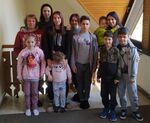"Many want to stay close to the border"
The situation in the countries near the border with Ukraine keeps changing. Many refugees hope to return quickly. However, the leaders of the UMC are focusing their relief efforts on the fact that the refugees will stay for a longer period of time.
The number of refugees coming to Europe from Ukraine is currently slightly decreasing. One reason may be the fact that the Russian army is concentrating its attacks more on the south of the country. In recent days, various media have even reported that a larger number of refugees are returning to Ukraine.
Slawomir Rodaszynski, superintendent of the UMC in Poland, confirms: "Many refugees want to stay as close to the border as possible so they can return as soon as possible when the situation in Ukraine has improved." But he also knows from conversations with refugees that husbands and fathers who have stayed in Ukraine worry about their family members who have fled and urge them: "Please stay in Poland and don't return yet."
The fact that the number of refugees has decreased is also confirmed by the two coordinators for work with refugees, Sarah Putman from Romania and Pastor Jana Krizova from the Czech Republic. The latter says: "People are still coming, but most of them want to stay longer than just a few days." Finding permanent housing solutions and related concerns such as school places for the children and jobs for the adults have therefore become more important. More and more local churches of the UMC are offering language courses or planning to do so in the near future.
Jessica Morris-Ivanova, pastor in Shumen, Bulgaria, also points to a new difficulty that is emerging for Bulgaria: The Bulgarian state has uncomplicatedly housed many people from Ukraine in hotels and resorts, she says. But when the summer season begins in less than a month, these accommodations will be needed differently. New solutions must therefore be found for many refugees.
In many places, refugees are offered help and the support they ever need. "We are so thrilled to have been able to open a Ukrainian day center in some of our church facilities," writes Jessica Morris-Ivanova on Facebook. The range of assistance refugees find here is broad. Language courses, art therapy, a safe place to gather for coffee and tea, food and hygiene packages, used clothing and free laundry facilities are offered, the pastor writes. This offer is possible because many people work together. Refugees who are already on site would have helped. "The Boy Scouts are organizing children’s activities, and the Rotary Club has brought food and kitchen utensils."
The Methodist congregation in Sevlievo, Bulgaria, has organized meetings that give Ukrainians from the region a chance to socialize and experience fellowship.
Furthermore, the UMC also arranges transports of relief goods to Ukraine - for example in Poland, the Czech Republic and Romania.
The UMC in Hungary supports the operation of a kitchen in Kaszony (Ukraine). There, 60 people receive a warm meal on a regular basis.
Karel Nyerges, director of the Methodist Diaconal Work in Czechia, says that so far, no psychological problems have emerged among the refugees from Ukraine living in permanent residential facilities. According to his observation, this is mainly due to the fact that "they are still dealing with issues related to staying in our country and thus personal problems recede into the background." Many refugees would hope that the situation in Ukraine would change quickly and they would be able to return to their homeland. Karel Nyerges, on the other hand, is convinced: "We must think ahead to the possibility that these people will begin to realize the seriousness of their situation and will need psychological or psychiatric help." For him, a priority is to gradually integrate these people into Christian and local communities so that they feel safe and accepted. "Our goal is to help these people to become independent from us so that they can live full lives."
Author: Sigmar Friedrich, Zurich

